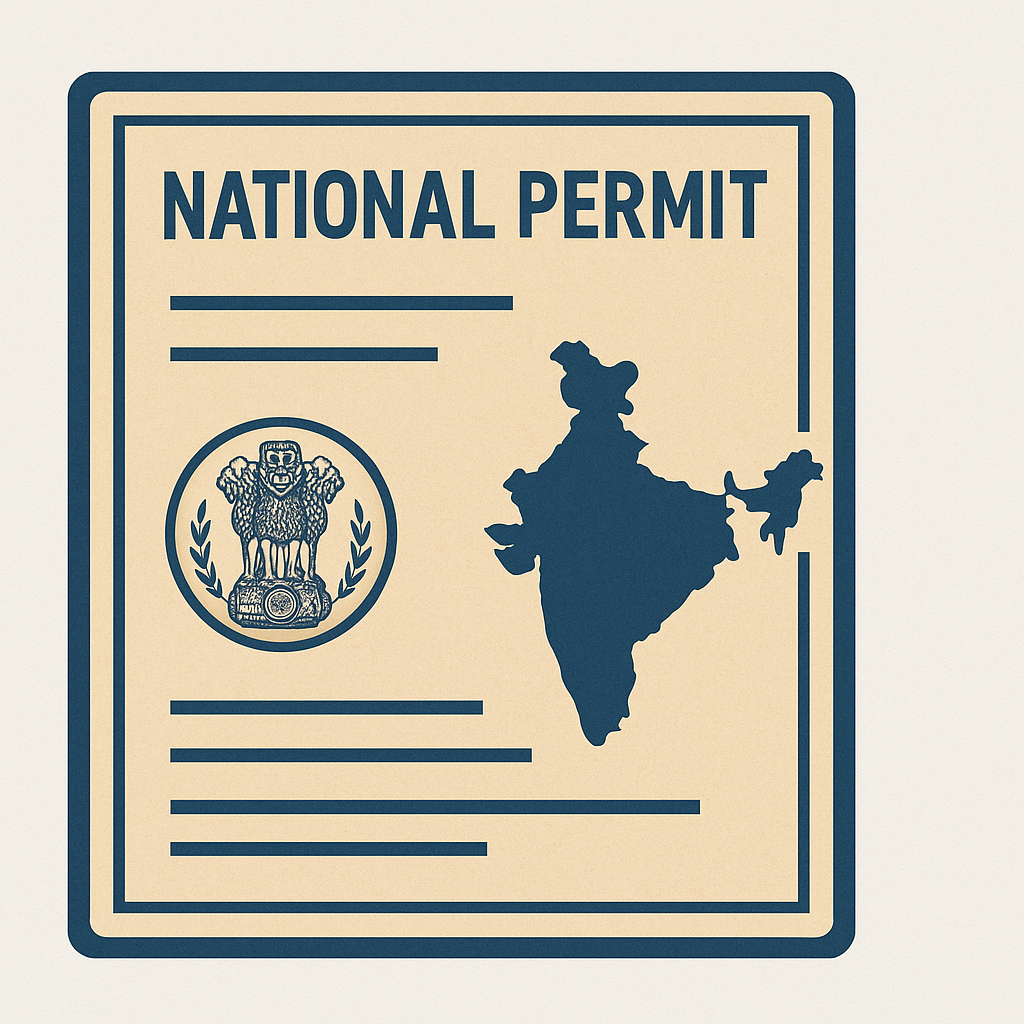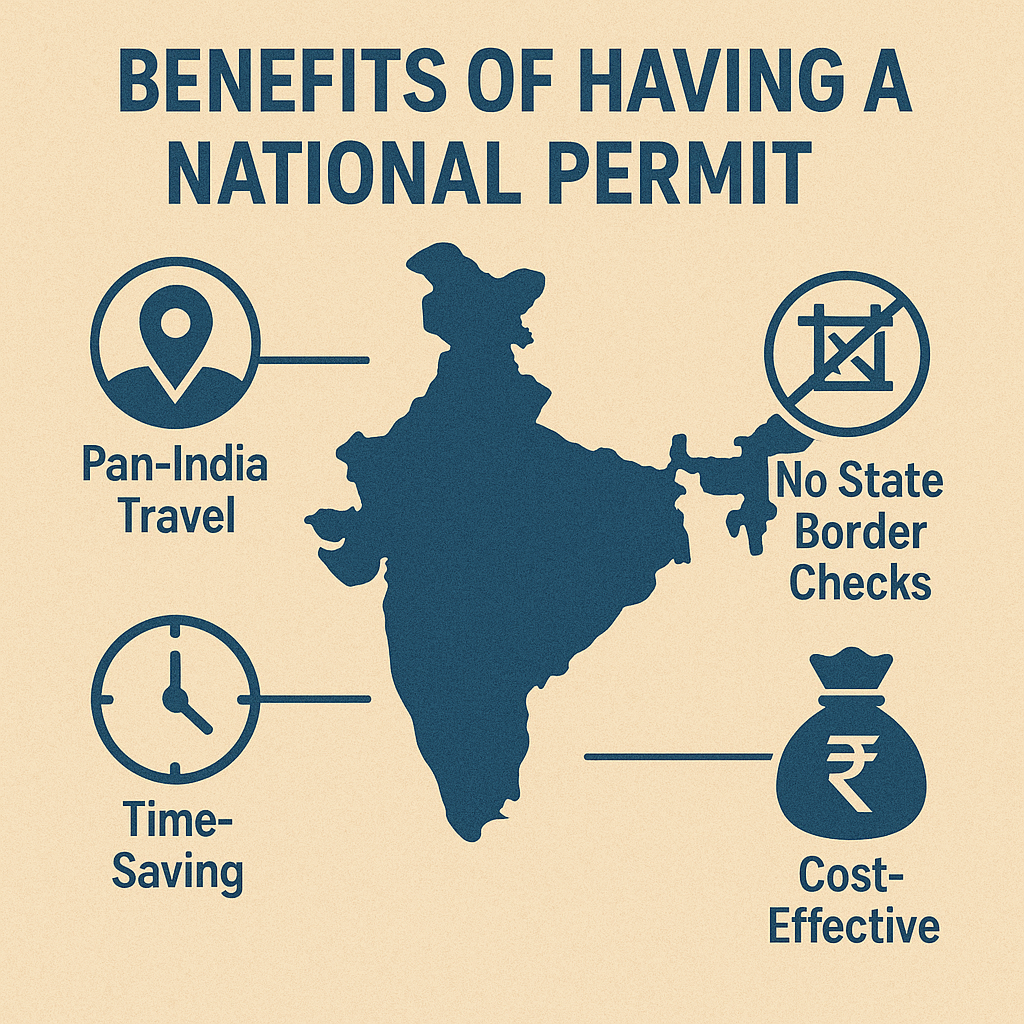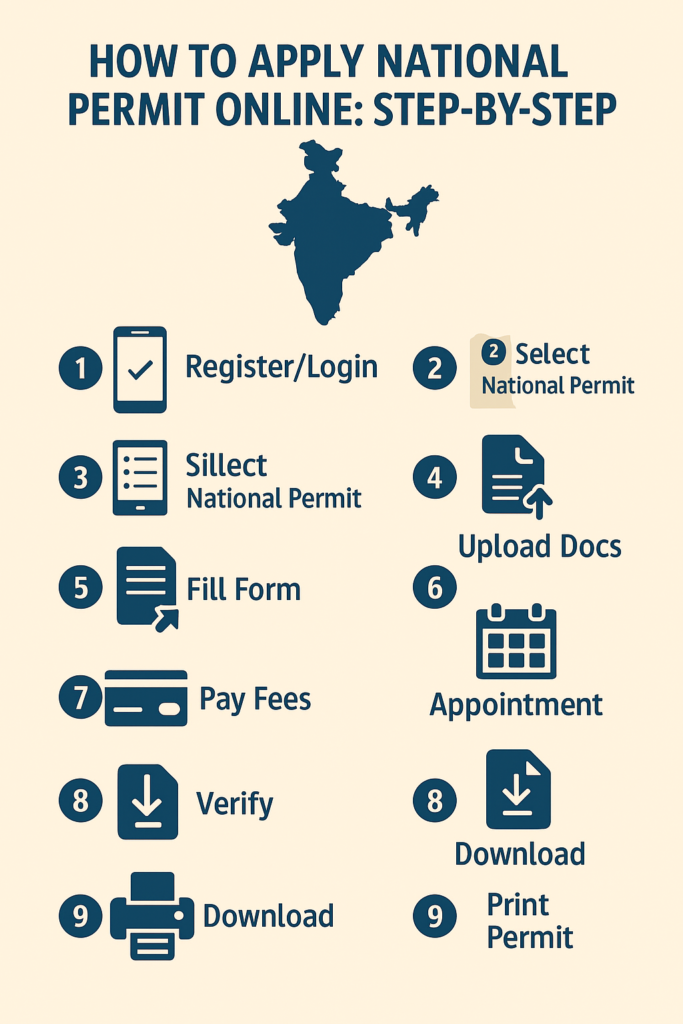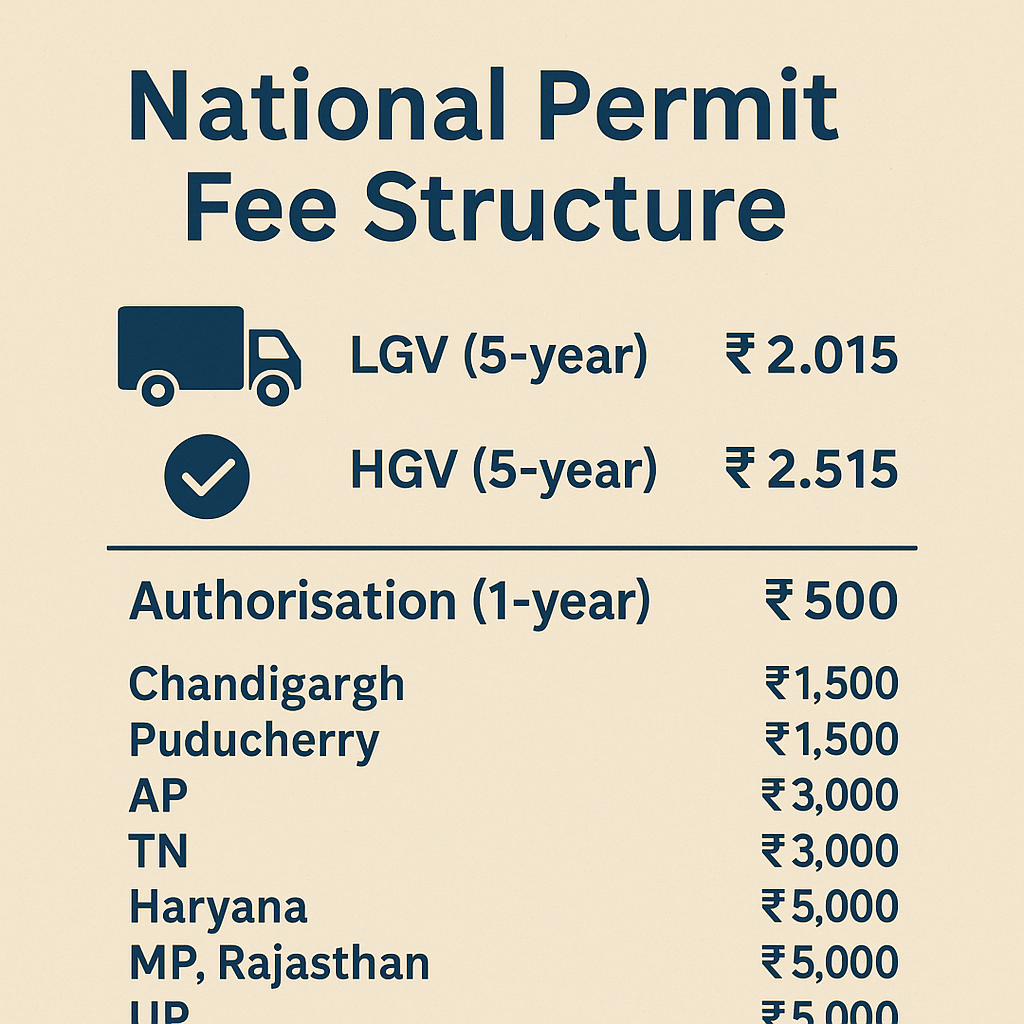National Permit in India: What It Is and Who Needs It
Apply National Permit Online and get hassle-free permission to drive your vehicle across India If you’re in the transport business or run commercial vehicles across states in India, getting your National Permit isn’t just a formality it’s a must. Without it, your vehicle risks hefty fines and legal roadblocks at state borders. But how do you apply for this crucial permit, and who exactly needs it? Let’s break down everything you need to know about the National Permit in India.

What is a National Permit in India?
A National Permit (NP) is an official authorization issued by the Regional Transport Office (RTO) that allows commercial vehicles to operate across multiple states in India. Unlike state permits, which restrict a vehicle’s movement to a single state, the National Permit enables interstate transport of goods and passengers without needing separate permits for each state.
This permit is essential for trucks, buses, and other commercial vehicles involved in long-distance transport. It is governed under the Motor Vehicles Act, 1988, and ensures smooth legal movement across state borders.
Who Needs a National Permit for Interstate Transport?
Any commercial vehicle that carries goods or passengers between two or more states in India must have a National Permit. This includes goods carriers like trucks and passenger vehicles like buses used for interstate travel.
Transporters and logistics companies rely on the NP to avoid the hassle of applying for multiple state permits. Without it, vehicles can face fines, penalties, or legal issues when crossing state lines.
In short, if your vehicle operates beyond your home state for commercial purposes, a National Permit is mandatory.
Benefits of Having a National Permit
The National Permit (NP) plays a critical role in India’s commercial transport sector by allowing vehicles to operate freely across state borders. Here’s why it’s indispensable:

- Interstate Operation Without Restrictions: With an NP, commercial vehicles can transport goods and passengers between any two or more states without needing separate state permits. This saves time and avoids administrative hurdles.
- Legal Compliance Under the Motor Vehicles Act: The NP is mandated by the Central Motor Vehicles Rules, 1989, ensuring your vehicle operates within the legal framework for interstate transport. Without it, vehicles risk hefty fines and detainment.
- Cost Efficiency: Applying for individual permits in every state is costly and time-consuming. The NP consolidates this into a single permit valid nationwide, reducing multiple application fees and paperwork.
- Business Expansion and Flexibility: The NP enables transporters to expand their routes and service areas nationwide, supporting logistics growth and improving market reach.
- Simplified Permit Management: Renewals and updates are streamlined since you manage one permit instead of multiple state permits. This reduces administrative burden for transport companies.
- Compliance Checks Made Easier: Enforcement agencies recognize the NP as a valid interstate transport authorization, reducing the chances of unnecessary checks and delays.
In short, the National Permit is essential for legal, efficient, and flexible interstate commercial transport in India.
Documents Required for apply National Permit online
To apply for a National Permit in India, the following documents are generally required as per the Motor Vehicles (MV) Act and Central Motor Vehicles Rules:
- Vehicle Registration Certificate (RC): Proof that the vehicle is registered with the RTO.
- Fitness Certificate: Valid certificate confirming the vehicle is roadworthy, usually issued after fitness tests at the state transport office.
- Insurance Certificate: Proof of valid insurance coverage for the vehicle.
- Pollution Under Control (PUC) Certificate: Confirms the vehicle meets pollution norms.
- Proof of Address of Applicant: Aadhaar card, utility bills, or other government-issued documents to confirm residence.
- Identity Proof: Valid government-issued ID like Aadhaar, PAN card, or Passport for the applicant.
- Driving License of Vehicle Driver: The driver’s valid license to operate commercial vehicles.
- No Objection Certificate (NOC): If the vehicle is financed or leased, permission from the financer or owner.
- Tax Payment Receipts: Proof of road tax or commercial vehicle tax payments as applicable.
- Application Form (Form 20 or equivalent): Completed and signed permit application form specific to national permits.
Different states may have minor variations, but these documents are the standard baseline across India. Ensuring these are complete and up-to-date will help avoid delays in processing your application.
How to Apply for a National Permit Online: Step-by-Step Guide
Applying for a National Permit online in India is now easier with the government’s digital platforms. Follow these steps to complete your application smoothly:

- Visit the Parivahan Sewa Portal: Go to the official Ministry of Road Transport and Highways website at parivahan.gov.in. This portal handles most permit-related services.
- Register or Log In: Create a user account if you’re a new user or log in with existing credentials.
- Select ‘Online Services’ > ‘Vehicle Related Services’: Navigate to the National Permit application section.
- Fill Out the Application Form: Enter vehicle details, owner information, and other required fields carefully.
- Upload Required Documents: Upload scanned copies of all essential documents such as RC, insurance, fitness certificate, pollution certificate, and identity proof.
- Pay the Application Fee: Pay the applicable fees online via available digital payment options like net banking, credit/debit cards, or UPI.
- Submit the Application: Review all details for accuracy before submission.
- Track Your Application: Use the portal’s tracking feature to monitor the application status until approval.
- Inspection and Verification: In some cases, the RTO may schedule a vehicle inspection before issuing the permit. Be prepared for this step.
- Receive Your Permit: Once approved, you’ll be notified through the portal or via email/SMS.
Following this process reduces physical visits to the RTO and speeds up permit issuance.
How to Download Your National Permit Online
After your National Permit application is approved, downloading your permit online is simple:
- Log In to the Parivahan Sewa Portal: Use your credentials to access your account.
- Go to the ‘Issued Permits’ or ‘Download Permit’ Section: This is typically found under vehicle-related services.
- Select Your Vehicle and Permit: Choose the relevant permit for download.
- Download the Permit as a PDF: Save a digital copy on your device.
- Print the Permit: For physical verification, keep a printed copy in the vehicle during interstate travel.
Additionally, some states integrate permit documents with DigiLocker, allowing secure, anytime access to your digital permit.
National Permit Fee Structure
The fees for obtaining a National Permit in India vary depending on the vehicle type, permit duration, and state-specific rules. Generally, the fee structure includes:

- Application Fee: A nominal fee paid when submitting the NP application online or offline.
- Permit Fee: Charged based on vehicle category (goods carrier or passenger vehicle) and the permit’s validity period (typically ranging from one to five years).
- Additional Charges: Some states may levy processing fees or taxes related to commercial vehicle operation.
- Renewal Fee: Similar to the initial permit fee, payable upon renewal to extend permit validity.
For example, goods carrier permits can cost anywhere from ₹2,000 to ₹10,000 or more, depending on the vehicle size and permit duration. Passenger vehicle permits often have a different fee scale.
Always check the official RTO or Parivahan portal for the latest fee details before applying.
rules and Regulations for National Permit Holders
Once you have the National Permit, you must comply with these key rules:
- Operate Only Within Permit Validity: Do not use the permit beyond its expiry date. Renew on time to avoid penalties.
- Carry the Permit During Travel: Always have the physical or digital copy available in the vehicle for inspection by transport authorities.
- Follow Vehicle Fitness and Safety Norms: Ensure the vehicle meets all fitness and pollution control standards continuously.
- Adhere to Load and Passenger Limits: Do not exceed the permitted load or seating capacity specified in the permit.
- Comply with Interstate Transport Laws: Follow all traffic rules and interstate transport regulations, including toll payments and tax compliance.
- Report Any Changes: Inform the RTO about changes in vehicle ownership or other relevant details.
- No Unauthorized Subletting: The permit is non-transferable and cannot be used by vehicles other than the one it was issued for.
Violating these rules can result in fines, suspension, or cancellation of the National Permit
